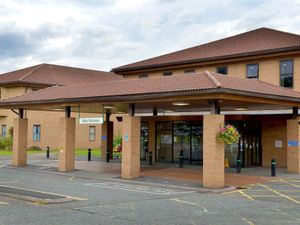Inquest told of six-hour wait for ambulance in Whitchurch
It was "unacceptable" that a woman of 78 had to wait six hours for an ambulance to arrive after she slipped and broke her femur while bringing in the washing at her home, a coroner has ruled.

Daphne Williams lay on concrete paving, with blankets brought by neighbours, when it happened last September at her home Glendower Place, Hanmer, near Whitchurch.
Recording a conclusion of accidental death at a hearing in Denbighshire, coroner John Gittins said he accepted medical evidence that "on the balance of probabilities" the delay had not contributed to her death a fortnight later at Maelor Hospital, Wrexham. The causes of death were renal and cardiac failure as well as other medical factors.
The coroner stated he would send a Section 28 Prevention of Future Deaths report to the Welsh Ambulance Service and the Betsi Cadwaladr health board but said he appreciated that "there is a very clear willingness to make things better".
Yesterday's inquest heard that Mrs Williams had lain on concrete outside her door, covered with blankets, while she waited for the ambulance to arrive. The call had been listed as serious but non life threatening.
An earlier hearing was told that the ambulance service had apologised to the family for the delay. The family was not present at yesterday's inquest.
Mr Gittins was told that the ambulance service had been under huge pressure that evening, with not only emergency calls but transfers between hospitals because of lack of beds.
He said that although the delay did not contribute to her death, that did not negate the requirement of a Section 28 Prevention of Future Deaths report.
The coroner said he was aware of "the huge body of work being undertaken by the ambulance service and the health board" about ambulance and admission delays. "There's a very clear willingness to try and make things better," he added.
In a statement read to the inquest, paramedic Ian Binnington, a lone first responder, said when he arrived at the scene at 9.30pm a confrontational and aggressive man said the delay was disgusting. "The family were angry and agitated but seemed to accept my apology for the delay," he recalled. He had given Mrs Williams morphine to deaden the pain.
The coroner also read a statement from a local GP saying he had made complaints in the past about the ambulance delays but because of no improvement had contacted the local media to complain.
Asked whether the delay had any impact on Mrs Williams's death, Dr Sara Gerrrie, a consultant physician, answered: "I have to say on the balance of probabilities I don't think it impacted on her mortality. It did impact on pain control."
She said: "If the family were here I would like to apologise to them."
Gill Plemming, of the ambulance service, said the call to Mrs Williams had been categorised as serious but not life threatening.
An ambulance was sent just before 6pm but had been diverted to a 'red' emergency. Assistance was sought from the ambulance service across the border in England but they were too busy to assist.
She told the coroner that constant measures were being introduced to try and improve the service. "It's not the service we wish," she remarked. "If the family was here I would offer my apologies and empathy with them."





